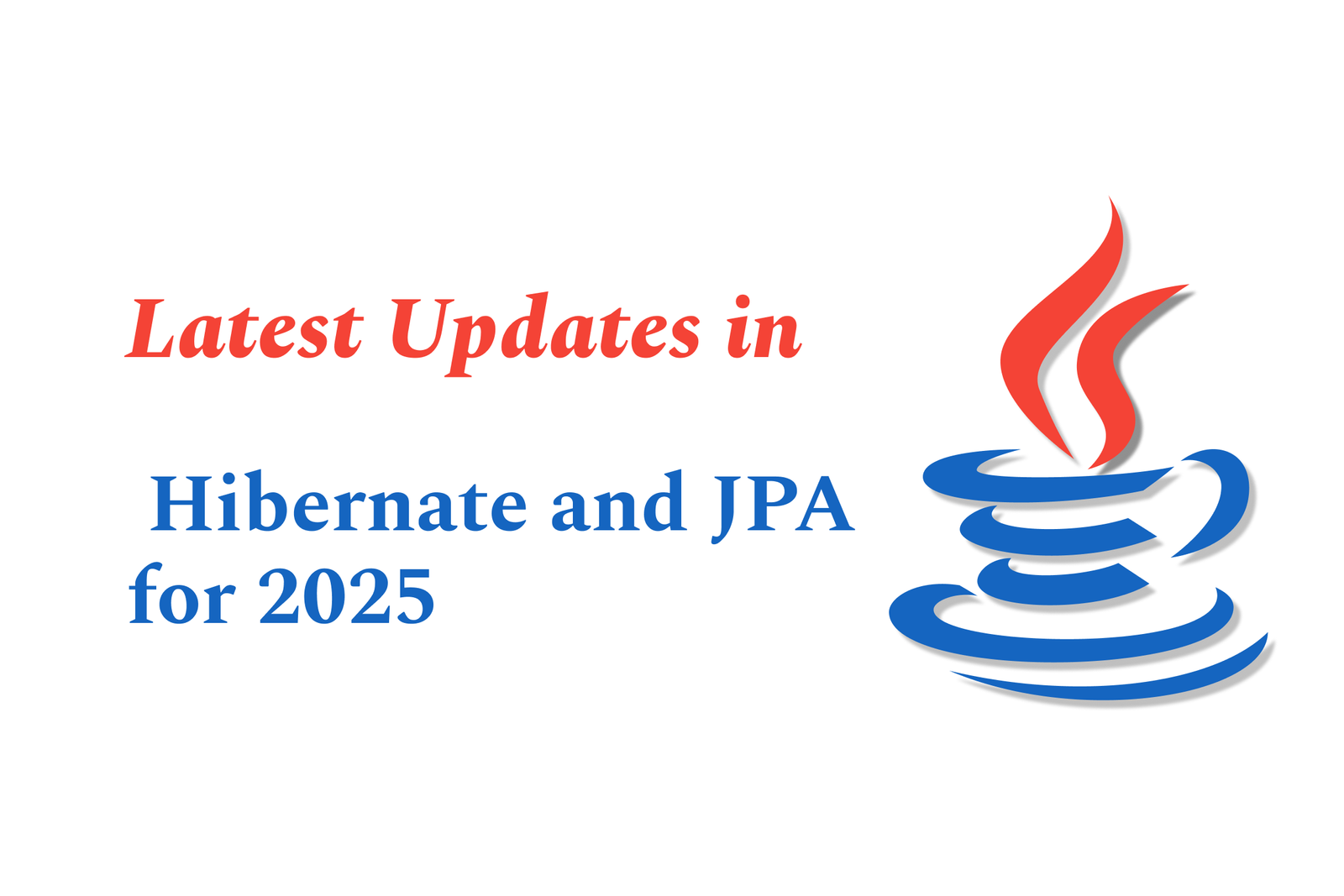Latest Updates in Hibernate and JPA for 2025
The latest Hibernate and JPA updates for 2025 include full Java 17 support, Jakarta Persistence 3.2 compliance, improved query capabilities, enhanced resource management, and advanced array and inheritance handling, ensuring modern, efficient, and scalable ORM solutions.
Latest Updates in Hibernate and JPA for 2025
1 ) Hibernate Version Releases and Support Status
Hibernate 7.1 (Development Version): Focuses on resource scanning and locking improvements. Planned release on July 30, 2025.
Hibernate 7.0 (Latest Stable Version): Released on July 27, 2025, with updates including Apache License adoption, Jakarta Persistence 3.2 compliance, Java 17 support, QuerySpecification enhancements, mapping.xsd updates, and improvements in Hibernate Models.
Hibernate 6.6 (Limited Support): Released July 27, 2025, includes Jakarta Data integration, new annotations like @ConcreteProxy, extended array support, and embeddable inheritance.
Hibernate 6.4 (Limited Support): Released August 6, 2024, features soft delete functionality, enhanced array functions, and support for non String tenant ids.
2 ) Notable Features Across Recent and Future Releases
Jakarta Persistence Upgrades: Compliance and support upgraded progressively to Jakarta Persistence 3.2, with significant feature improvements in query capabilities and data handling.
Java Platform Support: Full support for Java 17 in Hibernate 7.0, ensuring compatibility with recent Java language features and performance optimizations.
Advanced Query Mechanisms: Introduction of QuerySpecification to enhance type safe, flexible querying.
Resource Scanning and Locking Enhancements: Targeted at boosting application concurrency handling and resource management in development versions.
Array and Inheritance Support: Enhancements to support complex data structures, arrays, and inheritance hierarchies within embeddable components.
3 ) Evolution of APIs and Licensing
Transition to Apache License 2.0 since Hibernate 7.0 Beta 5, promoting more flexible usage and contribution.
Consolidated improvements in mapping schemas (mapping.xsd) improving configuration flexibility and error handling.
4 ) Maintenance and End of Life of Older Versions
Detailed end of life notices for versions such as 6.5, 6.3, 6.1, and below, encouraging users to migrate to supported versions for security and feature benefits.
5 ) Community and Support Resources
Continuous updates provided through official forums, documentation, migration guides, and commercial support options via Red Hat.
Emphasis on modernized toolchains and integration support facilitating smoother developer experience and project migration paths.
In summary, Hibernate and JPA in 2025 are embracing modern Java standards, enhanced persistence features, and improved resource management, with a clear roadmap guiding users through stable releases and innovative development while maintaining community support and alignment with Jakarta EE evolving standards.
https://justacademy.in/news-detail/breaking-changes-in-latest-flutter-version
https://justacademy.in/news-detail/how-react-native-is-helping-apps-go-global-faster
https://justacademy.in/news-detail/android-app-size-reduction-techniques
https://justacademy.in/news-detail/android-multi-user-feature-updates
https://justacademy.in/news-detail/react-native-2025:-what-meta?s-big-push-means-for-developers
Related Posts
Java supports GDPR and data privacy by enabling secure data handling through encryption, controlled access, and precise data management. It allows developers to minimize PII exposure, ensure data confidentiality, and design workflows that comply with data protection regulations effectively.
Java code quality tools have evolved to include advanced static analysis, integrated security checks, and AI-powered code reviews. These updates help developers detect bugs, enforce coding standards, and enhance security, streamlining the development process and improving overall code reliability.
Java remains a cornerstone in big tech companies, evolving with modern features like records, pattern matching, and virtual threads. Its robust ecosystem, enhanced performance, and growing AI integrations keep it vital for both legacy systems and innovative new projects.
Java and CI/CD pipeline optimizations streamline Java application development by automating builds, tests, and deployments. They improve efficiency through parallelization, caching, and secure secrets management, enabling faster feedback loops and more reliable, scalable software delivery.
Java supports modern cryptography standards through its flexible Java Cryptography Architecture (JCA), enabling integration of advanced algorithms like AES, EdDSA, and post-quantum tools. Libraries like Bouncy Castle offer FIPS-certified, hardware-accelerated implementations for secure development.
Java 23 enhances record patterns by enabling concise, direct destructuring of record components within pattern matching, simplifying type checks and data extraction. This improvement boosts code readability and expressiveness by reducing boilerplate in handling immutable data classes.
Java remains a top choice for mobile app backends, powering scalable, secure, and high-performance server-side solutions. Latest trends include cloud-native microservices, reactive programming, and enhanced JVM optimizations, enabling efficient, flexible, and robust mobile backend development.
Java SE 24 and LTS Java SE 21 offer enhanced features and performance, while Apache Spark 4.0.0 introduces Scala 2.13 support and advanced ML and SQL capabilities. Together, they empower developers to build scalable, high-performance data applications with modern tools.
JUnit 5 modernizes Java testing with a modular architecture, improved assertions, and seamless Java 8+ support. Beyond JUnit, tools like Mockito and AssertJ enhance mocking and assertions, creating a powerful, flexible ecosystem for writing clean, efficient Java unit tests.
Java plays a pivotal role in cloud automation tools by providing a robust, platform-independent language used to build scalable automation frameworks like Jenkins and Selenium, enabling efficient CI/CD pipelines, testing, and orchestration across diverse cloud environments.










